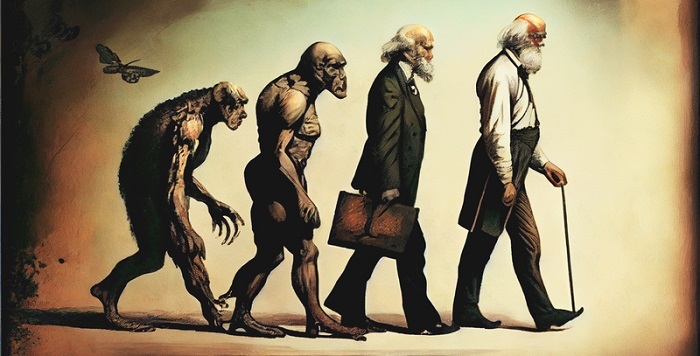

Classical Evolutionism refers to the early 19th-century cultural evolutionary theories of British anthropologists. These scholars sought to explain the development of human societies from primitive to civilized stages.
Tylor's theory of cultural evolution argued that societies progressed from simple to complex forms through a process of adaptation and invention.
Frazer, in his work "The Golden Bough," proposed the idea of comparative mythology, in which he compared the beliefs and practices of different cultures to identify patterns and similarities.

While these theories have been largely discredited and criticized for their ethnocentrism and oversimplification, they continue to influence modern anthropological thinking and remain important in the history of cultural anthropology.
According to unilineal evolutionists in Classical Evolutionism, human societies pass through a series of predetermined stages of cultural development. This theory was developed by Lewis Henry Morgan, who believed that all cultures progress through a series of stages, including savagery, barbarism, and civilization. In this view, societies move from simple, primitive forms to more complex, civilized forms in a linear, unidirectional manner. The stages are considered universal and are seen as a natural outcome of cultural development.
Cultural evolution − The idea that societies progress from simple, primitive forms to more complex, civilized forms over time through a process of adaptation and invention.
Unilinealism− Lewis Henry Morgan's theory that all societies pass through a series of predetermined stages, such as savagery, barbarism, and civilization.
Comparative mythology − James George Frazer's concept that the beliefs and practices of different cultures can be compared to identify patterns and similarities.
Adaptation and invention − Edward Tylor's theory that cultural evolution is driven by the need for survival and the desire for material comfort and improved social organization.
Ethnocentrism − The tendency to view one's own culture as superior to others.
Classical Evolutionism, despite its limitations, made several important contributions to the field of cultural anthropology −
Introduction of cultural evolution − The concept of cultural evolution was first introduced by classical evolutionists, who saw the development of societies as a process of adaptation and invention.
Comparative studies − James George Frazer's comparative mythology laid the foundation for comparative studies in cultural anthropology, in which the beliefs and practices of different cultures are compared to identify patterns and similarities
Historical perspective − Classical Evolutionism provided a historical perspective on the development of human societies, viewing cultural evolution as a process that occurs over time.
Foundation for later theories − The work of classical evolutionists laid the foundation for later anthropological theories, such as cultural ecology and structural functionalism.
Expansion of the discipline − Classical Evolutionism helped expand the discipline of cultural anthropology by establishing it as a separate field of study and encouraging research into different cultures and societies.
Classical Evolutionism is a controversial theory in cultural anthropology and has been criticized for several reasons −
Ethnocentrism − Classical Evolutionism is often criticized for its ethnocentric perspective, as it views Western civilization as the highest form of cultural evolution and portrays other cultures as primitive or inferior.
Oversimplification − The theory of unilineal evolution, which views societies as passing through predetermined stages, is seen as oversimplifying the complex and diverse process of cultural development.
Lack of cultural diversity − Classical Evolutionism ignores the cultural diversity and complexity of different societies, treating all cultures as if they were similar and following the same developmental path.
Scientific validity − Some have criticized the scientific validity of Classical Evolutionism, pointing out that the theories are based on limited data and lack empirical support.
Cultural determinism − The theory of cultural evolution is often criticized for its cultural determinism, as it views cultural change as the inevitable outcome of predetermined stages, rather than the result of social, economic, and political factors.
These criticisms have led to the decline of Classical Evolutionism as a dominant theory in cultural anthropology, and have encouraged the development of alternative approaches to the study of cultural evolution.
Edward Tylor, Lewis Henry Morgan, and James George Frazer's early 19th-century cultural evolutionary ideas developed in Britain are referred regarded as "classical evolutionism." Despite being generally rejected and attacked for its ethnocentrism and simplicity, classical evolutionism nevertheless plays a significant role in cultural anthropology's history and influences contemporary anthropological thought. It continues to play a significant role in the development of cultural anthropology and has an impact on contemporary anthropological thought. Criticisms have caused the prevailing paradigm of classical evolutionism in cultural anthropology to lose ground and have sparked the growth of alternative methods for examining cultural evolution.
Q1. What distinguishes neo-evolutionism from traditional evolutionism?
Ans. Classical evolutionism suggests that human societies have evolved in a linear, unilinear fashion from simple to complex forms, often associated with social Darwinism and race-based hierarchies. Neo-evolutionism, on the other hand, stresses the multilinear and diverse paths of cultural evolution, emphasizes the role of cultural factors in shaping human societies, and critiques the earlier social Darwinist and racist interpretations of human evolution.
Q2. What is the theory of Diffusionism?
Ans. Diffusionism is a cultural anthropology theory that explains the spread of cultural traits, such as beliefs, technologies, and social practices, from one society to another. Diffusionists believe that cultural diffusion, rather than independent invention, is the primary means by which cultures change and develop.
Q3.What do you mean by Universal and multilinear evolution?
Ans. Universal evolution proposes that all human societies pass through similar stages of development, regardless of their specific cultural or historical context. Multilinear evolution, on the other hand, recognizes that cultures evolve in diverse and independent ways and that there is no single path of cultural evolution that applies to all societies. This model stresses the importance of considering the unique historical, environmental, and cultural factors that shape the development of different societies.